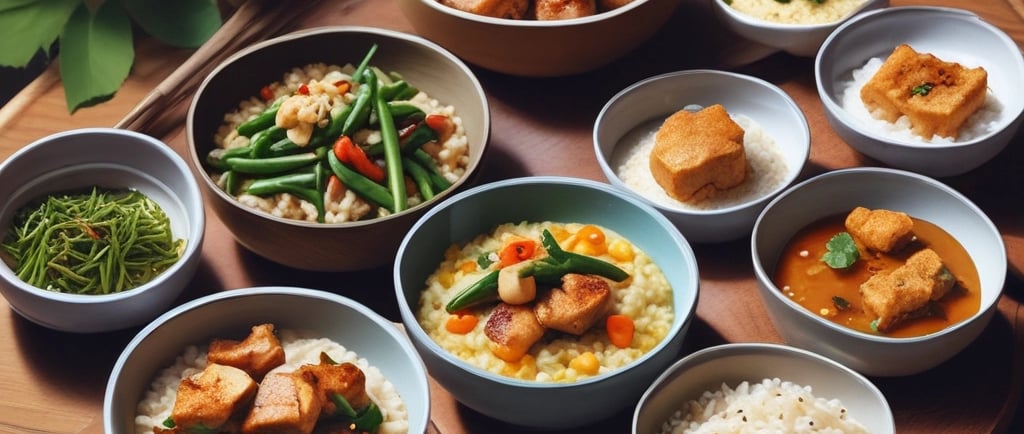Dojo Mode On: The Ultimate Indian Diet Plan for Karatekas in Mumbai
Kiai! 🥋 Sharpen your focus and power up your strikes. This is the ultimate Indian diet plan (veg & non-veg) for the dedicated Karateka. Fuel your discipline, from white belt to black belt.
Shuaieb Khan
5/10/20253 min read


Step into the dojo. The crisp, clean smell. The sound of a white gi snapping with a perfectly executed punch. The focused silence during kata. Karate is more than a sport; it's a way of life—a path of discipline, respect, and the relentless pursuit of perfection. This discipline, or Budo, doesn't end when you untie your belt. It extends to every part of your life, especially your nutrition.
To achieve kime—that explosive, decisive power in every technique—your body and mind must be in perfect harmony. And that harmony starts with your fuel. The right diet for a Karateka is about building a strong frame, fueling explosive movements, and sharpening the mind for absolute focus. Let’s get your nutrition on a black-belt level.
The Karateka's Nutritional Pillars
Your diet must support the unique demands of Karate: sharp techniques, mental clarity, and a strong physique.
Carbs for Explosive Kicks & Punches: Karate is built on fast, powerful, and precise movements. Carbohydrates are the primary fuel for these quick-twitch muscle fibers. Complex carbs (oats, brown rice, roti) provide sustained energy for long training sessions, while simpler carbs (fruits) can give a quick boost.
Lean Protein for a Powerful Frame: A strong punch or block comes from a strong body. Lean protein is essential for building and repairing muscle, as well as strengthening the tendons and ligaments that are crucial for powerful stances and techniques.
Nutrients for a Razor-Sharp Mind: Performing a complex kata requires immense focus. Foods rich in Omega-3s (fish, walnuts), antioxidants (colourful veggies), and B-vitamins (whole grains, eggs) are vital for brain health and concentration.
Calcium for Strong Bones: Karate involves impact. Strong bones are your first line of defense. A diet rich in calcium and Vitamin D (from dairy, leafy greens, fortified foods) is non-negotiable for any serious Karateka.
Pre-Dojo Fuel: The Centering Meal
Eat a light but energizing meal about 1.5-2 hours before training. You want to feel light on your feet, not sluggish.
Focused Choices:
A small bowl of upma or poha.
An apple with a handful of almonds.
Two whole-wheat crackers with paneer.
Post-Dojo Recovery: Replenish and Repair
After a tough session of kumite (sparring) or kihon (basics), refuel within an hour. A combination of protein and carbs is key.
The Complete Indian Karateka's Diet Plan
This plan is designed for discipline, power, and focus.
Veg Karateka's Diet Plan
Breakfast: A bowl of oatmeal cooked with milk, topped with banana and walnuts. Side of a glass of milk for extra calcium.
Lunch: A simple, balanced meal of 2 rotis, a bowl of mixed dal, a seasonal vegetable sabzi (like beans or carrots), and a large bowl of salad. This meal is pure, Sattvic energy.
Snack: A bowl of yogurt (dahi) or a handful of roasted chana.
Dinner: Vegetable and paneer pulao. It’s a one-pot meal that provides a great balance of carbs, protein, and nutrients. Keep it light and easy to digest for optimal recovery.
Non-Veg Karateka's Diet Plan
Breakfast: 3-4 boiled eggs with one yolk, and a side of fruit. Simple, effective, protein-packed.
Lunch: 150g of steamed fish, a portion of brown rice, and a side of stir-fried green vegetables like broccoli or green beans. Clean fuel for a clean technique.
Snack: A chicken clear soup or a small bowl of sprouts.
Dinner: A home-style chicken stew with lots of vegetables (carrots, potatoes, peas). It's wholesome, nourishing, and provides everything needed for overnight repair.
Frequently Asked Questions (FAQs)
Q1: What is the best thing to eat before a Karate tournament? A: On tournament day, have a light, carbohydrate-rich breakfast you are familiar with (like oatmeal or idli) about 3 hours before your event. Avoid anything heavy, greasy, or high in fibre. Sip water and maybe have a banana about an hour before you compete for a final energy boost.
Q2: How can my diet improve my focus for learning a new kata? A: A balanced diet rich in Omega-3 fatty acids (from fish, walnuts, flaxseeds) and antioxidants (from berries, dark leafy greens) supports brain health. Also, avoiding sugary junk food and maintaining stable blood sugar levels by eating complex carbs prevents brain fog and helps maintain sharp focus.
Q3: Are there specific Indian foods that are good for bone strength in Karate? A: Yes! Dairy products like milk, paneer, and yogurt are excellent sources of calcium. For plant-based options, ragi, sesame seeds (til), chickpeas, and dark leafy greens like spinach and fenugreek (methi) are great choices.
Q4: Is it a good idea to train Karate on an empty stomach? A: For a light, early morning session, some people are comfortable training on an empty stomach. However, for a long or intense session, it’s best to have a small, easily digestible snack (like a banana) beforehand to ensure you have enough energy to perform at your best and maintain focus.
